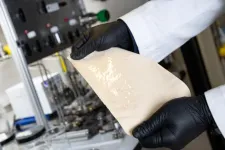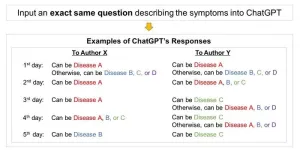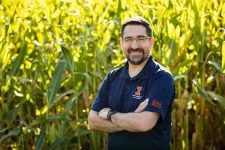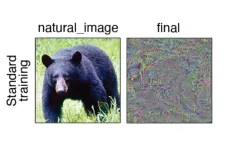(Press-News.org) A new kind of polymer membrane created by researchers at Georgia Tech could reshape how refineries process crude oil, dramatically reducing the energy and water required while extracting even more useful materials.
The so-called DUCKY polymers — more on the unusual name in a minute — are reported Oct. 16 in Nature Materials. And they’re just the beginning for the team of Georgia Tech chemists, chemical engineers, and materials scientists. They also have created artificial intelligence tools to predict the performance of these kinds of polymer membranes, which could accelerate development of new ones.
The implications are stark: the initial separation of crude oil components is responsible for roughly 1% of energy used across the globe. What’s more, the membrane separation technology the researchers are developing could have several uses, from biofuels and biodegradable plastics to pulp and paper products.
“We're establishing concepts here that we can then use with different molecules or polymers, but we apply them to crude oil because that's the most challenging target right now,” said M.G. Finn, professor and James A. Carlos Family Chair in the School of Chemistry and Biochemistry.
Crude oil in its raw state includes thousands of compounds that have to be processed and refined to produce useful materials — gas and other fuels, as well as plastics, textiles, food additives, medical products, and more. Squeezing out the valuable stuff involves dozens of steps, but it starts with distillation, a water- and energy-intensive process.
Researchers have been trying to develop membranes to do that work instead, filtering out the desirable molecules and skipping all the boiling and cooling.
“Crude oil is an enormously important feedstock for almost all aspects of life, and most people don't think about how it's processed,” said Ryan Lively, Thomas C. DeLoach Jr. Professor in the School of Chemical and Biomolecular Engineering. “These distillation systems are massive water consumers, and the membranes simply are not. They're not using heat or combustion. They just use electricity. You could ostensibly run it off of a wind turbine, if you wanted. It’s just a fundamentally different way of doing a separation.”
What makes the team’s new membrane formula so powerful is a new family of polymers. The researchers used building blocks called spirocyclic monomers that assemble together in chains with lots of 90-degree turns, forming a kinky material that doesn’t compress easily and forms pores that selectively bind and permit desirable molecules to pass through. The polymers are not rigid, which means they’re easier to make in large quantities. They also have a well-controlled flexibility or mobility that allows pores of the right filtering structure to come and go over time.
The DUCKY polymers are created through a chemical reaction that’s easy to produce at a scale that would be useful for industrial purposes. It’s a flavor of a Nobel Prize-winning family of reactions called click chemistry, and that’s what gives the polymers their name. The reaction is called copper-catalyzed azide-alkyne cycloaddition — abbreviated CuAAC and pronounced “quack.” Thus: DUCKY polymers.
In isolation, the three key characteristics of the polymer membranes aren’t new; it’s their unique combination that makes them a novelty and effective, Finn said.
The research team included scientists at ExxonMobil, who discovered just how effective the membranes could be. The company’s scientists took the crudest of the crude oil components — the sludge left at the bottom after the distillation process — and pushed it through one of the membranes. The process extracted even more valuable materials.
“That's actually the business case for a lot of the people who process crude oils. They want to know what they can do that’s new. Can a membrane make something new that the distillation column can't?” Lively said. “Of course, our secret motivation is to reduce energy, carbon, and water footprints, but if we can help them make new products at the same time, that's a win-win.”
Predicting such outcomes is one way the team’s AI models can come into play. In a related study recently published in Nature Communications, Lively, Finn, and researchers in Rampi Ramprasad’s Georgia Tech lab described using machine learning algorithms and mass transport simulations to predict the performance of polymer membranes in complex separations.
“This entire pipeline, I think, is a significant development. And it's also the first step toward actual materials design,” said Ramprasad, professor and Michael E. Tennenbaum Family Chair in the School of Materials Science and Engineering. “We call this a ‘forward problem,’ meaning you have a material and a mixture that goes in — what comes out? That's a prediction problem. What we want to do eventually is to design new polymers that achieve a certain target permeation performance.”
Complex mixtures like crude oil might have hundreds or thousands of components, so accurately describing each compound in mathematical terms, how it interacts with the membrane, and extrapolating the outcome is “non-trivial,” as Ramprasad put it.
Training the algorithms also involved combing through all the experimental literature on solvent diffusion through polymers to build an enormous dataset. But, like the potential of membranes themselves to reshape refining, knowing ahead of time how a proposed polymer membrane might work would accelerate a materias design process that’s basically trial-and-error now, Ramprasad said.
“The default approach is to make the material and test it, and that takes time. This data-driven or machine learning-based approach uses past knowledge in a very efficient manner,” he said. “It’s a digital partner: You’re not guaranteed an exact prediction, because the model is limited by the space spanned by the data you use to train it. But it can extrapolate a little bit and it can take you in new directions, potentially. You can do an initial screening by searching through vast chemical spaces and make go, no-go decisions up front.”
Lively said he’d long been a skeptic about the ability of machine learning tools to tackle the kinds of complex separations he works with.
“I always said, ‘I don't think you can predict the complexity of transport through polymer membranes. The systems are too big; the physics are too complicated. Can't do it.’”
But then he met Ramprasad: “Rather than just be a naysayer, Rampi and I took a stab at it with a couple of undergrads, built this big database, and dang. Actually, you can do it,” Lively said.
Developing the AI tools also involved comparing the algorithms’ predictions to actual results, including with the DUCKY polymer membranes. The experiments showed the AI models predictions were within 6% to 7% of actual measurements.
“It's astonishing,” Finn said. “My career has been spent trying to predict what molecules are going to do. The machine learning approach, and Rampi’s execution of it, is just completely revolutionary.”
This research was supported by the U.S. Department of Energy, grant No. DE-EE0007888; the European Research Council, grant No. 758370; the Kwanjeong Educational Foundation; a Royal Society University Research Fellowship; and the ExxonMobil Technology and Engineering Company. Any opinions, findings, and conclusions or recommendations expressed in this material are those of the authors and do not necessarily reflect the views of any funding agency.
END
New polymer membranes, AI predictions could dramatically reduce energy, water use in oil refining
The membranes would improve distillation processes that account for 1% of the world’s energy use
2023-10-16
ELSE PRESS RELEASES FROM THIS DATE:
Firearm exposure associated with poorer health in communities around the U.S.
2023-10-16
Gun violence is tied to poverty, unemployment, broken families, disengaged youth and racial segregation, according to a study by the New Jersey Gun Violence Research Center at Rutgers.
Published in the Journal of Urban Health, the study found that people living in disadvantaged communities face gun violence at higher levels that are harmful to the health and well-being of whole neighborhoods.
“Many of America’s most disadvantaged neighborhoods are stuck in a vicious cycle of violence and collateral damage that is almost impossible to escape,” ...
Transforming wastewater into valuable chemicals with sunlight
2023-10-16
Researchers led by Prof. GAO Xiang from the Shenzhen Institute of Advanced Technology (SIAT) of the Chinese Academy of Sciences and Prof. LU Lu from the Harbin Institute of Technology have proposed a novel method to transform wastewater contaminants into valuable chemicals using sunlight, thus paving the way for sustainable and eco-friendly chemical manufacturing.
The study was published in Nature Sustainability on Oct. 16.
Conventional chemical manufacturing relies on energy-intensive processes. Semiconductor biohybrids, integrating efficient light-harvesting materials with superior living cells, have emerged as an exciting advancement ...
Viral persistence and serotonin reduction can cause long COVID symptoms, Penn Medicine research finds
2023-10-16
PHILADELPHIA—Patients with long COVID – the long-term symptoms like brain fog, fatigue, or memory loss in the months or years following COVID-19 – can exhibit a reduction in circulating levels of the neurotransmitter serotonin, according to new research published today in Cell. The study, led by researchers from the Perelman School of Medicine at the University of Pennsylvania, sheds new light on the mechanisms of how persistent inflammation after contracting the SARS-CoV-2 virus can cause long-term neurological symptoms.
According to the CDC, nearly one in five American adults who had COVID-19 experience symptoms of long ...
Can ChatGPT diagnose your condition? Not yet
2023-10-16
A research group led by Tokyo Medical and Dental University (TMDU) finds that when common orthopedic symptoms are given, ChatGPT’s diagnosis and recommendations are inconsistent
Tokyo, Japan – ChatGPT, a sophisticated chatbot driven by artificial intelligence (AI) technology, has been increasingly used in health care contexts, one of which is assisting patients in self-diagnosing before seeking medical help. Although it seems very useful at first glance, AI may cause more harm than good to the patient if it is not accurate in its diagnosis and recommendations. A research team from Japan and ...
Leaders in resuscitation science, education and technology commit to 1 million more lives saved each year by 2030
2023-10-16
DALLAS and STAVANGER, Norway, October 16, 2023 — For nearly 20 years, the American Heart Association® (Association) and Laerdal Medical (Laerdal) have together developed and brought resuscitation education, training and technology to the health care market. The Association and Laerdal will now expand their focus beyond education to creating and nurturing health care quality improvement solutions to impact a community “systems of care” approach and influence more positive patient outcomes. This World Restart a Heart Day, the organizations are furthering their collaborative relationship ...
Management zone maps of little use to corn growers, study finds
2023-10-16
CHAMPAIGN, Ill. — A multiyear analysis tested whether management zone maps based on soil conditions, topography or other landscape features can reliably predict which parts of a cornfield will respond best to higher rates of seeding or nitrogen application. The study found that – contrary to common assumptions – crop-plot responses to the same inputs vary significantly from year to year. The most unpredictable factor – the weather – seemed to have the biggest impact on how the crops responded to these inputs.
The ...
Study: Deep neural networks don’t see the world the way we do
2023-10-16
CAMBRIDGE, MA -- Human sensory systems are very good at recognizing objects that we see or words that we hear, even if the object is upside down or the word is spoken by a voice we’ve never heard.
Computational models known as deep neural networks can be trained to do the same thing, correctly identifying an image of a dog regardless of what color its fur is, or a word regardless of the pitch of the speaker’s voice. However, a new study from MIT neuroscientists has found that these models often also respond the same way to images or words that have no resemblance to the target.
When these neural networks were used to generate an image ...
Moffitt research finds non-small cell lung cancer drug lorlatinib targets additional protein
2023-10-16
TAMPA, Fla. — Targeted cancer drugs are widely used because of their ability to inhibit specific proteins involved in cancer development with fewer side effects compared to chemotherapy drugs. But targeted therapies can often inhibit other unknown proteins. These hidden targets may also contribute to the drug’s anticancer effects and potentially offer a path for the drug to be repurposed for other cancers controlled by the hidden target.
In a new study published in Cell Chemical Biology, Moffitt Cancer Center researchers demonstrate this, showing that the ROS1 inhibitor lorlatinib has activity against an additional protein called PYK2. The team also reveals the mechanisms of ...
Medicaid is a vital lifeline for adults with Down syndrome
2023-10-16
FOR IMMEDIATE RELEASE
Monday October 16, 2023
Contact:
Jillian McKoy, jpmckoy@bu.edu
Michael Saunders, msaunder@bu.edu
##
Life expectancy has increased substantially for people in the United States with Down syndrome, from a median age of 4 years old in the 1950s to 57 years old in 2019. This longer life span increases the need for adequate healthcare into adulthood for this population, the majority of whom are at high ...
American Society of Anesthesiologists recognizes Santhanam Suresh, M.D., MBA, FASA, with its Excellence in Education Award
2023-10-16
SAN FRANCISCO — The American Society of Anesthesiologists (ASA) today presented Santhanam Suresh, M.D., MBA, FASA, with its 2023 Excellence in Education Award in recognition of his extraordinary educational contributions to advancing regional anesthesia and pain management in children. The award is presented annually to an ASA member who has made significant contributions to the specialty through excellence in teaching, development of new teaching methods or the implementation of innovative educational programs.
Dr. Suresh is the Arthur C. King professor and chair emeritus of pediatric anesthesiology ...
LAST 30 PRESS RELEASES:
Emerging class of antibiotics to tackle global tuberculosis crisis
Researchers create distortion-resistant energy materials to improve lithium-ion batteries
Scientists create the most detailed molecular map to date of the developing Down syndrome brain
Nutrient uptake gets to the root of roots
Aspirin not a quick fix for preventing bowel cancer
HPV vaccination provides “sustained protection” against cervical cancer
Many post-authorization studies fail to comply with public disclosure rules
GLP-1 drugs combined with healthy lifestyle habits linked with reduced cardiovascular risk among diabetes patients
Solved: New analysis of Apollo Moon samples finally settles debate about lunar magnetic field
University of Birmingham to host national computing center
Play nicely: Children who are not friends connect better through play when given a goal
Surviving the extreme temperatures of the climate crisis calls for a revolution in home and building design
The wild can be ‘death trap’ for rescued animals
New research: Nighttime road traffic noise stresses the heart and blood vessels
Meningococcal B vaccination does not reduce gonorrhoea, trial results show
AAO-HNSF awarded grant to advance age-friendly care in otolaryngology through national initiative
Eight years running: Newsweek names Mayo Clinic ‘World’s Best Hospital’
Coffee waste turned into clean air solution: researchers develop sustainable catalyst to remove toxic hydrogen sulfide
Scientists uncover how engineered biochar and microbes work together to boost plant-based cleanup of cadmium-polluted soils
Engineered biochar could unlock more effective and scalable solutions for soil and water pollution
Differing immune responses in infants may explain increased severity of RSV over SARS-CoV-2
The invisible hand of climate change: How extreme heat dictates who is born
Surprising culprit leads to chronic rejection of transplanted lungs, hearts
Study explains how ketogenic diets prevent seizures
New approach to qualifying nuclear reactor components rolling out this year
U.S. medical care is improving, but cost and health differ depending on disease
AI challenges lithography and provides solutions
Can AI make society less selfish?
UC Irvine researchers expose critical security vulnerability in autonomous drones
Changes in smoking status and their associations with risk of Parkinson’s, death
[Press-News.org] New polymer membranes, AI predictions could dramatically reduce energy, water use in oil refiningThe membranes would improve distillation processes that account for 1% of the world’s energy use





